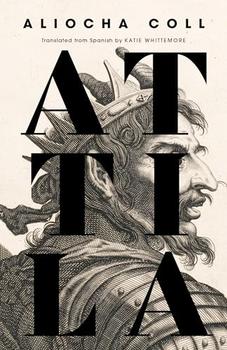
by Aliocha Coll
"My life will not make any sense when Attila is finished," declared Aliocha Coll about his mesmerizing final novel.
In this groundbreaking "untranslatable" work, he channels Joycean experimentalism to explore the fragility of empires, the future of the city, and the weight of legacy.
Attila the Hun, reimagined as a visionary leader, contemplates the fate of his people at the gates of Rome. His son, Quijote, is caught between empires and ideals, forced to choose between his father's vision of a Hunnic utopia and the decaying allure of Roman civilization. As Rome burns, Quijote journeys through both real and surreal landscapes, encountering psychedelic visions, mystical revelations, and existential dilemmas.
Quijote's journey blurs the lines between past and future, uniting Biblical, Classical, and Buddhist traditions while moving between planes of existence. Attila is an intricate and elusive masterpiece from the explosive and disorienting imagination of Aliocha Coll, where characters from myth and history intermingle in a stunning labyrinth of allegory and metaphor.
"More than its sequence of events, the novel is propelled by its unique prose, thrillingly translated by Whittemore: 'Disturbing and anemophilous plasticity, how could one not understand this town's mystic suicides, pierce yourself and reside in the rhythms.' This dazzles." —Publishers Weekly (starred review)
This information about Attila was first featured
in "The BookBrowse Review" - BookBrowse's membership magazine, and in our weekly "Publishing This Week" newsletter. Publication information is for the USA, and (unless stated otherwise) represents the first print edition. The reviews are necessarily limited to those that were available to us ahead of publication. If you are the publisher or author and feel that they do not properly reflect the range of media opinion now available, send us a message with the mainstream reviews that you would like to see added.
Any "Author Information" displayed below reflects the author's biography at the time this particular book was published.
The pseudonym of Javier Coll Mata (Madrid, May 6, 1948–Paris, November 15, 1990), Aliocha Coll was a Spanish writer and translator raised in Barcelona who spent several years of his adult life in Paris, where he committed suicide after completing Attila. He is the subject of "Everything Bad Comes Back" by Javier Marías, and believed in Finnegans Wake as the "starting point" for contemporary literature. In addition to Attila, he wrote a couple novels, a play, and several essays, but the majority his work was either published posthumously or remains unpublished, despite Spanish super agent Carmen Balcells backing him throughout her life as the future of Spanish literature.
Your guide toexceptional books
BookBrowse seeks out and recommends the best in contemporary fiction and nonfiction—books that not only engage and entertain but also deepen our understanding of ourselves and the world around us.